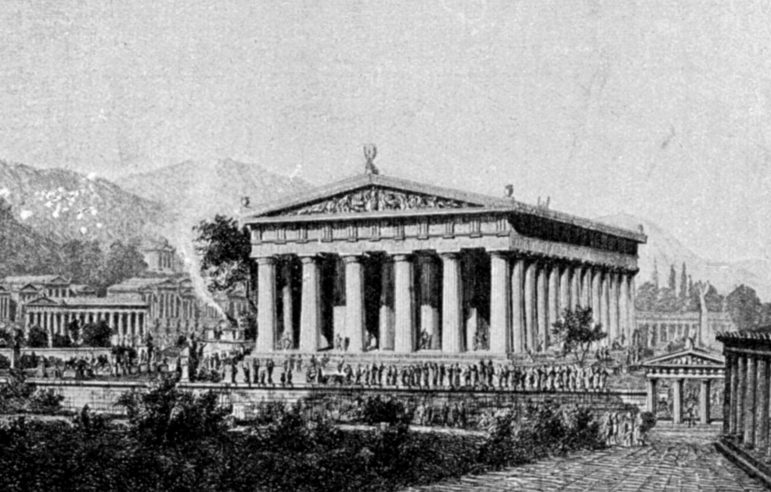TWH – The website of the modern Olympics quotes Prof. Paul Christesen of Dartmouth College as he noted the Olympics’ Pagan origins. Dr. Christesen said, “At its heart, the Ancient Olympic Games was a religious festival held in a religious sanctuary.”
Dr. Christesen added, “it was not just a matter of playing sports”. The Olympics were located on a temple site. “The Greeks were aggressively polytheistic,” said Christesen. “So while Olympia is a sanctuary to Zeus we know that he wasn’t the only deity worshipped at the site. There were over 70 different altars, you could sacrifice to pretty much anyone you wanted to.”
In the ancient games, the runner in the foot race acted as an officiant in a ritual sacrifice. A priest would sacrifice the animals and place the portion for the gods on the altar. In “Greek Religion,” Walter Burkett described the sacrificial ritual at the ancient games. Before burning the offering, a priest would use a torch to give the signal. That signal would start the foot race. The runner would then run to the sacred olive tree of Zeus at the finish line. That tree provided the leaves for the victory wreaths. The victor would then go to the ash-altar of Zeus. Once there, they would light the fire to consume the offering.

Official emblems of Beijing 2022 Winter Olympics and Paralympics
The Perseus Project of the Classics Department at Tufts University described the ancient games as “part of a major religious festival honoring Zeus, the chief Greek god.” Those games became one of the biggest events in the Greek world. Midway through those games, priests would sacrifice 100 oxen. Athletes would pray and make offerings to their gods for victory.
The ancient games always occurred at Olympia in the northwestern Peloponnese, facing the Ionian Sea.
Walter Burkett wrote in “Greek Religion” that The Olympics began as a funeral game. Like someone keening and wailing, the athlete would perform grief through expending energy.
Aretē
Performative grief may have driven the early ancient games. Over time, “virtue ethics” became more dominant.
Zeus did not hand down commandments. Instead, the Greeks developed a set of virtues, or habits of behavior, that promoted their idea of a good life. That tradition has come down to us today as the field of virtue ethics.
Plato and Aristotle both described virtue. According to them virtue “is connected with performing a function.” The habitual practice of virtue enhances that function.
Aristotle argued that people had the function to live a good life. When virtue has become habitual, a good life will follow. Like Jefferson, he meant the male elite, not all people.
People competed as individuals. They did not compete as representatives of city-states. This individual competition reflected the Greek value of Arete. Scholars usually translate that term as excellence with more than a hint of honor. In the Greek world, the habitual practice of Arete led to fame and glory. Habitual Arete drove Greek art, athletics, culture, and philosophy to their heights.
An Olympic winner did not just win an athletic event. The athlete pursuit of Arete led to their victory. Losing a contest brought shame and disgrace. Athletes caught cheating had to pay a fine. Those fines paid for bronze statues of Zeus. On those statues, the authorities had inscribed, the offenses that paid for the statue. Those statures also carried aspirational messages. Some messages stressed that skill, not money, led to victory. Others emphasized “the Olympic spirit of piety toward the gods and fair competition.” Those statues lined the road to the stadium.
Arete also imbued the artistic works throughout the ceremonial complex. The habitual practice of Arete drove the architects, sculptors, and stonemasons to create the beauty of the monumental structures at Olympia. It also drove the poets to extol the prowess of winners. Major poets like Pindar wrote these praise poems. Some of those poems outlasted the statues and temples of Olympia. Unlike the modern games, non-athletes had ways to excel in the ancient games.
Gender and who could compete and attend
The ancient games were far from egalitarian. The Perseus Project of the Classics Department at Tufts University described the differences between the ancient and modern Olympics. Only free, Greek-speaking males could compete. For most events, they competed in the nude. In the 30 days before the competition, athletes would have to abstain from sex and meat.
The Perseus Project said that officials barred women from competing. It was a capital crime for married women to even attend. Maidens could however attend. The ancient Olympics were part of the cult of Zeus.
The cult of Hera, however, did have footraces for females at Olympia. Three races were held. One for girls, one for teenagers, and one for young women. Unfortunately, very little about these foot races have survived.

Wilhelm Lübke’s illustration of the Temple of Zeus as it might have looked in the fifth century BC
The sacred truce
National Geographic noted that the Greek world stopped organized violence during these games. This truce protected people going to the games. During this truce, Greek armies would stop fighting wars. The truces would frequently hold. A similar truce occurred during the Rites of Eleusis.
The ceremonial complex
Olympia housed a large ceremonial complex as well as a stadium. The complex contained a grove sacred to Zeus, an ash altar to Zeus, and a Temple to Zeus. Befitting a polytheistic culture, it also had 70 altars for sacrifices, each to a different god.
The ancients called the sacred grove of Zeus in Olympia, “Altis.” It had the form of an irregular quadrangle with sides measuring 183 meters (600.4 feet). The Altis also housed other altars and votive offerings. Greek city-states had small treasuries in the Altis.
Theoi quoted Pausanias, a Greek traveler, who lived from roughly 110 to 180 C.E. He described his experience in the sanctuary. He said that after leaving the Temple of Zeus, a person would ascend the citadel. From there, they could see several temples: that of Dionysius Nyctelius (Nocturnal), that of Aphrodite Epitrophia, and that of Zeus Conius. Nearby stood the Chamber of Demeter. Other Temples in the area included those of Isis, Apollon, and Artemis.
The Ash Altar to Zeus
The Joukowsky Institute for Archaeology & the Ancient World at Brown University explained that the Greeks did not build the Altar of Zeus at Olympia out of stone. The accumulation of hundreds of years of bone and ash made the altar. With each sacrifice, priests would place another thigh bone wrapped in fat on the altar and burn it. In the Second Century C.E., Pausanias estimated its height. Modern scholars converted his measurement to modern ones. It would have stood 7 meters (22 feet) tall.
One suspects that on hot days, the altar would have given off a memorable aroma.
That ash altar to Zeus marked the spot where a thunderbolt had struck, long before the ancient games began. Myth said that Zeus hurled it himself from Mount Olympus, on the other side of Greece.
The Temple of Zeus
Inside the Temple of Zeus, stood the statue of Zeus, one of the Seven Wonders of the Greco-Roman World. Historians have estimated it would have stood over 12 meters (40 feet) high. Sculptors used ivory and gold for the face of Zeus. Clay and gypsum made up the rest of the statue.
The ancient games were organized around the cult of Zeus. Unfortunately, that spelled their doom. In 393 C.E., the Christian fanatic Emperor Theodosius banned pagan rituals throughout the Empire, ending the games for 1,500 years, but not forever. The modern Olympics began in 1896.
Today the Olympics are decidedly secular, more inclusive, and more egalitarian than in the past. They have created their own rituals and traditions, and yet the pageantry of the Olympic games of antiquity still linger.
The Wild Hunt is not responsible for links to external content.
To join a conversation on this post:
Visit our The Wild Hunt subreddit! Point your favorite browser to https://www.reddit.com/r/The_Wild_Hunt_News/, then click “JOIN”. Make sure to click the bell, too, to be notified of new articles posted to our subreddit.